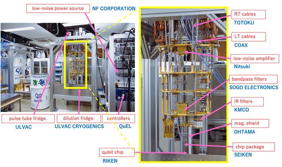Home > Press > Japan launches fully domestically produced quantum computer: Expo visitors to experience quantum computing firsthand
 |
| Parts of the fully Japan-made quantum computer
Credit QIQB, The University of Osaka |
Abstract:
A Japanese superconducting quantum computer, fully designed and built with homegrown components and software, went live on July 28th at The University of Osakas Center for Quantum Information and Quantum Biology (QIQB). This achievement signifies Japan’s technological prowess in quantum computing, demonstrating the nation’s capacity to design, manufacture, and integrate a complete quantum system. Visitors to Expo 2025, Osaka, Kansai, Japan will have the opportunity to interact with this cutting-edge technology through a dedicated exhibit.
Japan launches fully domestically produced quantum computer: Expo visitors to experience quantum computing firsthand
Osaka, Japan | Posted on August 8th, 2025
The project, spearheaded by QIQB, along with RIKEN and leading Japanese companies such as ULVAC, Inc., ULVAC CRYOGENICS INC., e-trees.Japan, Inc., QuEL, Inc., QunaSys Inc., Systems Engineering Consultants Co.,LTD., TIS Inc., and Fujitsu Limited achieved complete technological self-reliance by replacing previously imported components, such as the dilution refrigerator and pulse tube refrigerator with domestic alternatives. Furthermore, the entire software ecosystem, from front-end to back-end, is open-source and developed in Japan, leveraging the Open Quantum Toolchain for OPerators & USers (OQTOPUS).
This project demonstrates Japan’s comprehensive mastery of the different technologies required for quantum computer manufacturing and system integration. Quantum computers hold immense potential for addressing global challenges, from developing new materials and medicines to optimizing complex systems and mitigating environmental impact. They also promise to revolutionize everyday life through advancements in fields like machine learning.
From August 14th to 20th, Expo 2025, Osaka, Kansai, Japan will host a special exhibition titled “entangle moment [quantum, ocean, universe] x art,” showcasing components of the domestically produced quantum computer. Visitors will have the unique opportunity to connect to the system remotely via cloud access and perform simple quantum programs, gaining firsthand experience with this cutting-edge technology. The exhibit, designed to be accessible to a wide audience regardless of technical expertise, also features interactive elements exploring quantum entanglement and other quantum phenomena. In collaboration with Professor Akihiro Kubota of Tama Art University, the exhibit will include quantum computer-generated art, further bridging the gap between science and artistic expression. This Expo exhibit promises to provide an engaging and informative experience, demystifying quantum technology and inspiring the next generation of quantum innovators.
####
About The University of Osaka
The University of Osaka was founded in 1931 as one of the seven imperial universities of Japan and is now one of Japan’s leading comprehensive universities with a broad disciplinary spectrum. This strength is coupled with a singular drive for innovation that extends throughout the scientific process, from fundamental research to the creation of applied technology with positive economic impacts. Its commitment to innovation has been recognized in Japan and around the world. Now, The University of Osaka is leveraging its role as a Designated National University Corporation selected by the Ministry of Education, Culture, Sports, Science and Technology to contribute to innovation for human welfare, sustainable development of society, and social transformation.
For more information, please click here
Contacts:
Saori Obayashi
The University of Osaka
Office: 81-661-055-886
Copyright © The University of Osaka
If you have a comment, please Contact us.
Issuers of news releases, not 7th Wave, Inc. or Nanotechnology Now, are solely responsible for the accuracy of the content.
News and information
![]()
Sensors innovations for smart lithium-based batteries: advancements, opportunities, and potential challenges August 8th, 2025
![]()
Deciphering local microstrain-induced optimization of asymmetric Fe single atomic sites for efficient oxygen reduction August 8th, 2025
![]()
Lab to industry: InSe wafer-scale breakthrough for future electronics August 8th, 2025
Possible Futures
![]()
ICFO researchers overcome long-standing bottleneck in single photon detection with twisted 2D materials August 8th, 2025
![]()
New molecular technology targets tumors and simultaneously silences two undruggable cancer genes August 8th, 2025
![]()
Simple algorithm paired with standard imaging tool could predict failure in lithium metal batteries August 8th, 2025
![]()
First real-time observation of two-dimensional melting process: Researchers at Mainz University unveil new insights into magnetic vortex structures August 8th, 2025
Quantum Computing
![]()
Quantum computers simulate fundamental physics: shedding light on the building blocks of nature June 6th, 2025
![]()
Magnetism in new exotic material opens the way for robust quantum computers June 4th, 2025
![]()
Programmable electron-induced color router array May 14th, 2025
Announcements
![]()
Sensors innovations for smart lithium-based batteries: advancements, opportunities, and potential challenges August 8th, 2025
![]()
Deciphering local microstrain-induced optimization of asymmetric Fe single atomic sites for efficient oxygen reduction August 8th, 2025
![]()
ICFO researchers overcome long-standing bottleneck in single photon detection with twisted 2D materials August 8th, 2025
![]()
New molecular technology targets tumors and simultaneously silences two undruggable cancer genes August 8th, 2025
Tools
![]()
Rice researchers harness gravity to create low-cost device for rapid cell analysis February 28th, 2025
![]()
New 2D multifractal tools delve into Pollock’s expressionism January 17th, 2025
![]()
Turning up the signal November 8th, 2024










